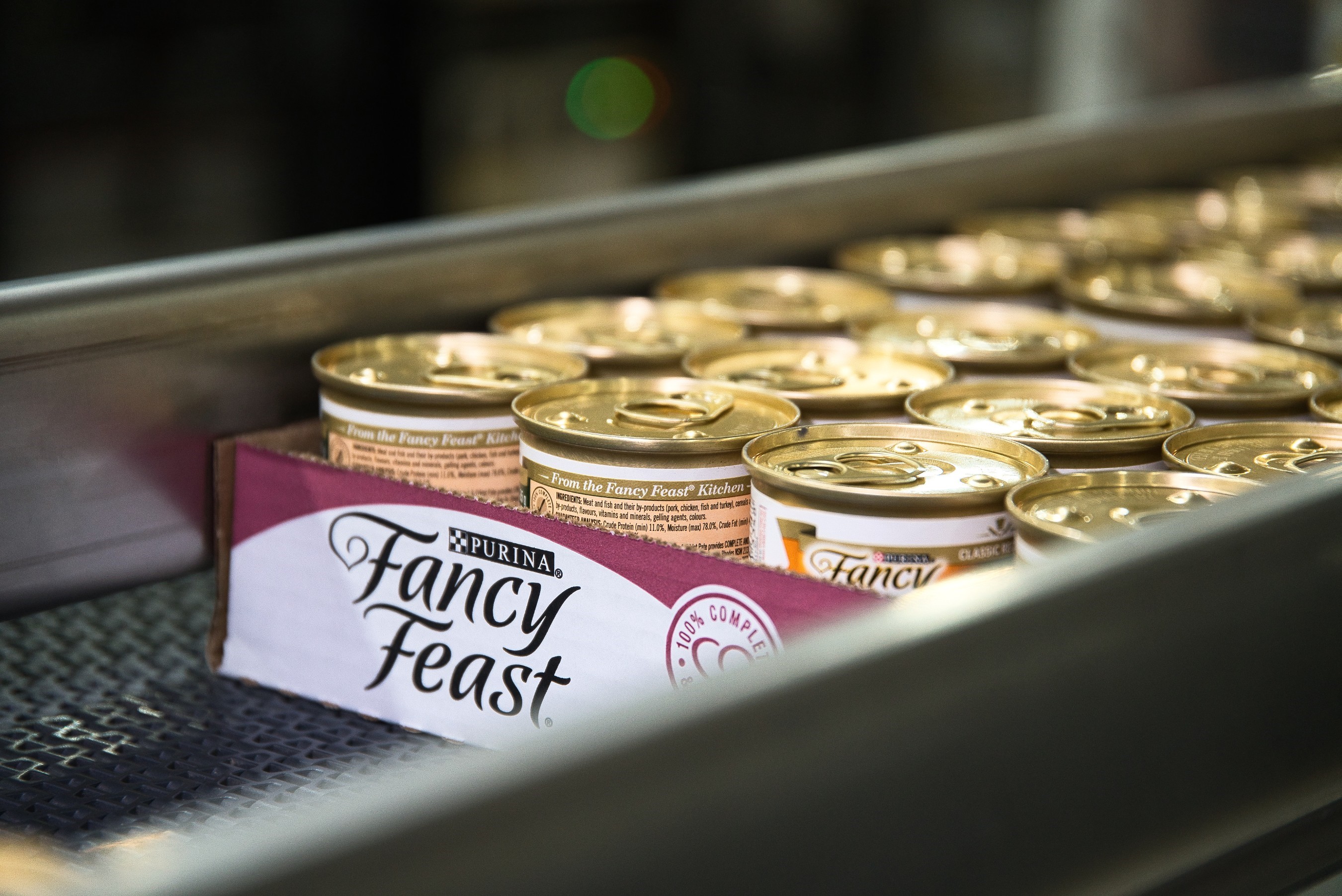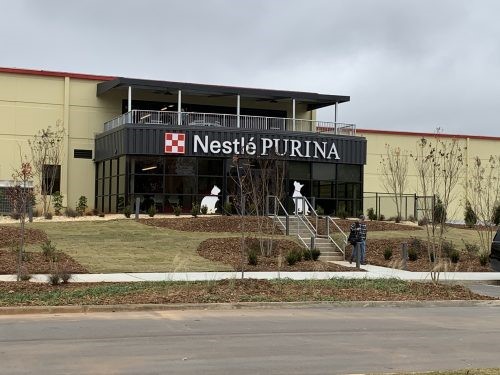
At Purina’s new facility in Hartwell, employees make and distribute the company’s popular pet food brands, such as Fancy Feast, the nation’s best-selling wet cat food. Photo courtesy Nestlé Purina PetCare Co.
At first glance, you might not think an electric co-op and a pet food manufacturer have much in common. But you’d be wrong — at least in the case of Walton EMC and Nestlé Purina PetCare Company (Purina).
Purina’s new pet food manufacturing plant and distribution center in Hartwell is one of the co-op’s newest industrial customer-owners. Although the facility is located outside of Walton EMC’s service territory, Georgia’s Customer Choice law allows a new industrial customer with a high electricity demand to choose its supplier.
When Purina executives decided to invest $320 million to open the company’s first factory in two decades, they chose Walton EMC as their electricity supplier because of its reputation for helping companies meet their renewable energy goals.
“They had learned about Walton EMC’s contract with Facebook to provide 100 percent renewable energy for their data center in Newton and asked if we’d be interested in a similar arrangement for them,” said Robert Rentfrow, Walton EMC’s senior vice president of power supply.
Powering economic development
The power supply agreement created another important link between the two entities: boosting the local economy.
“We were happy to oblige when Purina asked Walton EMC to be their electric supplier because we know that new industry equals new jobs,” said Rentfrow. “In turn, new jobs strengthen our regional economy, creating a better quality of life for all of us who live here.”
Providing reliable, affordable electricity — by renewable or traditional means — is among the ways Walton EMC helps to bring new businesses and more employment opportunities to northern Georgia.
Providing reliable, affordable electricity — by renewable or traditional means — is among the ways Walton EMC helps to bring new businesses and more employment opportunities to northern Georgia, said Greg Brooks, Walton EMC’s community and public relations director.
The Hartwell facility is Purina’s 21st factory in the U.S. and represents Nestlé’s single largest investment in a pet care facility in the last decade in North or South America.
“We're very excited to bring more quality jobs to the state of Georgia, as well as expanding our capacity and distribution in the Southeast,” said John Bear, the company’s vice president of manufacturing.
In 2017, the company bought the former Springs Industries plant built in 1991 to produce and warehouse consumer textiles. “The plant operated under a couple of different owners until 2006 when it closed and put 1,200 people out of work,” Brooks said. The facility remained mostly empty over the next decade, with part of the building being used for storage by a few local companies.
Purina purchased the long-idled textile facility, demolished much of the existing structure and then began remaking and rebuilding the site into a modern, technology-driven factory. Meanwhile, Walton EMC, in conjunction with Georgia Transmission Corporation, built a substation and installed distribution lines to accommodate the plant’s electricity needs.
Cooperative-supplied electricity helped Purina open a 190,000-square-foot distribution center at the site in 2018. The factory’s pet food manufacturing lines began rolling last November. The company’s website boasts that the factory is “our most versatile facility with the ability to switch product lines faster and more efficiently than we have ever done before.”
Workers at the facility make and distribute Purina’s wet pet food brands, such as Fancy Feast, Purina ONE and Pro Plan. The products ship to the southeastern pet care market.
In its initial stage, the new plant employs 200. When it reaches full capacity, the employee count is expected to be 240.

A long-idled textile factory was dismantled to make way for Purina’s innovative facility that will soon be powered by 100 percent renewable energy.
Choosing renewable energy
Purina is teaming with Walton EMC to achieve the goal of using 100 percent renewable energy to run the manufacturing and distribution facility. Currently, 24 percent of electricity used in Nestlé Purina facilities worldwide comes from renewable sources.
Purina is teaming with Walton EMC to achieve the goal
of using 100 percent renewable energy to run its
manufacturing and distribution facility in Hartwell.
Plans call for Purina to use renewable solar power generated at a Georgia facility that is under construction. Walton EMC distributes renewable electricity generated from low-impact solar farms and hydroelectric plants, as well as from biomass and landfill gas projects.
It is projected that the Hartwell plant’s daily power requirements (when fully operational) will equal that of 1,850 average-sized homes. By choosing to use renewable energy, the facility will reduce greenhouse gas emissions equal to removing about 2,200 cars from Georgia roads each year, according to estimates by the U.S. EPA’s Green Power Equivalency Calculator.
The Hartwell facility also features innovative water conservation and treatment methods. In addition, it sends zero waste for disposal to traditional landfills, instead using composting, recycling and energy recovery.
Innovations at the local plant reflect parent company Nestlé’s plans to achieve zero net greenhouse gas emissions by 2050. This includes using 100 percent renewable electricity in Nestlé-owned factories, warehouses, logistics and offices. The Hartwell facility is the newest among a third of Nestlé factories (144) that are already using 100 percent renewable electricity.
Environmental innovations at the Hartwell facility demonstrate Nestlé’s “commitment to continually innovate and shape the future of pet care,” said Laurent Freixe, CEO for the company’s North and South Americas zone.
Caring for the community
The co-op and the pet food maker also share a desire to improve the local quality of life through community initiatives. In 2019 alone, Walton EMC customer-owners and employees strengthened communities with more than $24 million in charitable donations, education grants and scholarships and local taxes.
Purina reflects a similar concern for community. The pet food maker has pledged to benefit the Hart County community and their pets by supporting local shelters, education initiatives, hunger relief and other civic causes, such as funding pet-friendly domestic violence shelters through its Purple Leash Project with Red Rover. During a ceremony celebrating the official opening of the Hartwell plant, Purina donated $20,000 to the Northeast Georgia Council on Domestic Violence in support of that project.
Concern for community, economic development and environmental stewardship are just three ways Walton EMC and Purina have bonded in the last three years. Having similar values is making it easy for the co-op and the cat food maker to form a “purr-fect” connection.